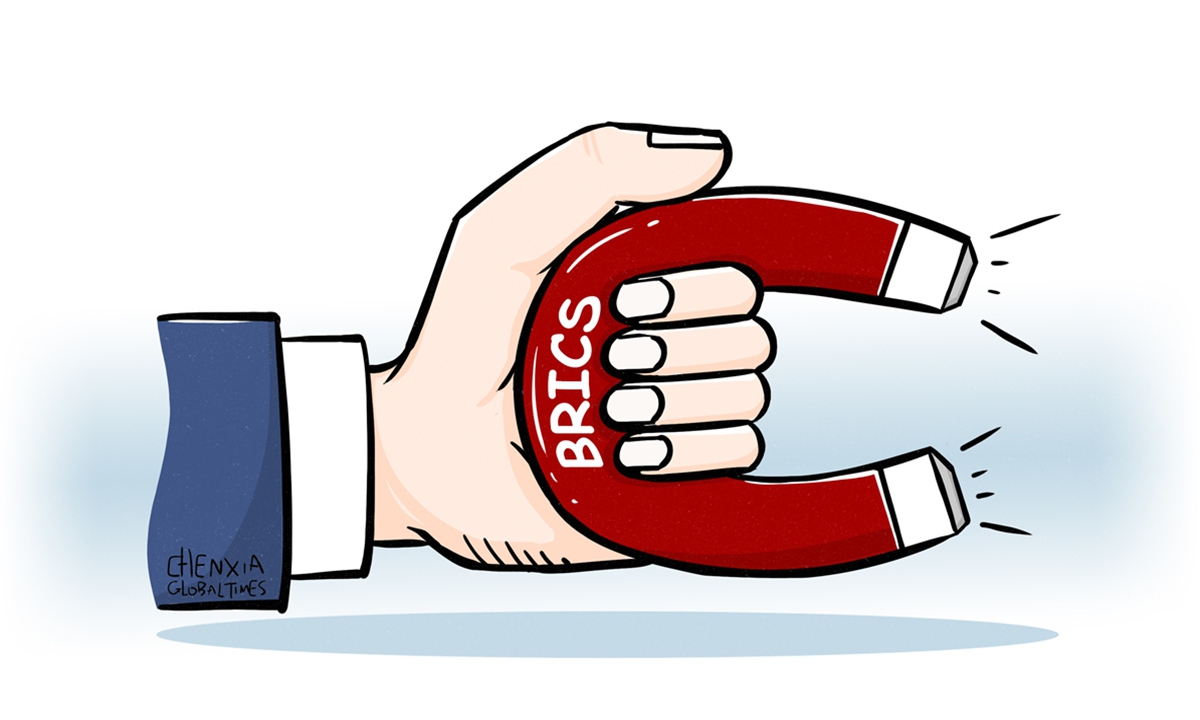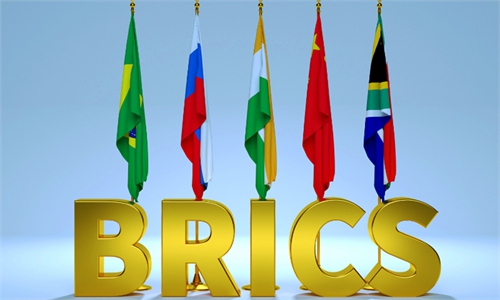
Illustration: Chen Xia/Global Times
BRICS has invited Argentina, Egypt, Ethiopia, Iran, Saudi Arabia and the United Arab Emirates as new members, strengthening the "voice of the Global South." Their membership will begin in January 2024. Although economic performance has been varied, the group's desire for equality and development remains strong.BRICS already represents around 40 percent of the world's population and more than a quarter of the world's GDP. With the additions, it will represent almost half the world's population, and will include three of the world's biggest oil producers, Saudi Arabia, the UAE and Iran. Some of the political characteristics of the BRICS can be traced back to the 1955 Bandung Conference and the Non-Aligned Movement. The Bandung Conference was mainly attended by countries that had recently gained independence from colonial rule and were part of independence movements. These countries wanted to protect their own interests and assert their independence in the face of the superpowers. The BRICS' expansion shows the Global South seeks to strengthen their strategic autonomy and brings hope of restructure to countries in the group. The Global South does not want to be told how to handle its own sovereign affairs.
The formation of BRICS (formerly known as BRIC) in 2009 was driven by the idea that the four emerging markets of China, Brazil, Russia and India would become the future economic powerhouses of the world. In 2010, South Africa officially joined the group. Then BRIC turned into BRICS. So, the expansion of BRICS this time proved again BRICS is an inclusive and developing mechanism.
Before the summit, more than 40 countries from the Global South have shown an interest in joining BRICS, with 23 making formal requests to join. Some Western media outlets predicted groundlessly the expansion might fail. The suspicion and sense of threat from Western countries toward the expansion of the BRICS this time proves their great fear of decline. The West is trying to damage the image of the BRICS countries through propaganda, weaken the determination and confidence of its member states, and destroy the unity of the BRICS in a targeted manner, so as to prevent the group's rise. Many people believe that India and Brazil opposed the expansion of BRICS. But the fact is that Indian Prime Minister Narendra Modi and Brazilian President Luiz Inacio Lula da Silva have openly explained their positive attitude toward the expansion. The final decision made by BRICS members has shown the spirit of unity.
A larger BRICS aims for development and political autonomy. The Global South's close attention to the summit reflects their expectation that the BRICS countries can fill the current gap in global governance. Emerging market economies have been successively affected by the COVID-19 pandemic and the Russia-Ukraine conflict. The support from Washington is negligible, and the US has continuously raised interest rates, causing global economic shocks. At the just concluded BRICS summit, the Global South is voicing its dissatisfaction with the rules made by the G7 in the past decades.
There are two reasons why so many countries have applied to join BRICS. On the one hand, politically, they no longer want to succumb to the hegemony of the US, but desire to shape a multipolar world order with equal dialogue. On the other hand, they hope to obtain funds from the New Development Bank and strengthen economic and trade exchanges and cooperation with member countries. This is especially important for the Global South in the post-pandemic era.
There are voices advocating for de-dollarization and the launch of a BRICS currency, but this issue is complex and challenging as the US dollar has long served as the dominant global reserve currency. Nonetheless, it is an indisputable fact that the dependence of emerging markets on the US dollar will weaken. For example, India and Bangladesh use Chinese yuan for settlement when purchasing Russian oil, while Brazil and China have announced the phase-in of a yuan clearing arrangement for some trade between the two countries. The Global South is expecting an independent and stable monetary system.
Countries in the Global South have long felt the cost of support from US-led financial institutions such as the International Monetary Fund and the World Bank. Some African countries believe that aligning with these financial institutions is not in the interests of their own people, but an excuse for the West to interfere in their internal affairs. Finding alternative institutions is necessary to save these countries from the current development dilemma.
There is no doubt that the expanded BRICS will become an eminent group on the world stage, and even an important change-maker. This expansion is a historical milestone. It will be a new starting point for the solidarity and cooperation of the BRICS countries and will inject new vitality into the development of the Global South.
The author is a research fellow at the Centre for BRICS Studies, Communication University of China. opinion@globaltimes.com.cn

